
The effectiveness and implications of the cashless bail policy have come under intense scrutiny following a tragic incident in Charlotte, North Carolina. Decarlos Brown Jr., charged with the stabbing death of Iryna Zarutska, a 23-year-old Ukrainian refugee on a Charlotte train, had an extensive rap sheet. This included at least 14 prior arrests in North Carolina since 2007 for crimes ranging from assault and firearms possession to felony robbery and larceny. Despite this history of violence and documented mental illness, Brown was reportedly free on cashless bail, released by a magistrate on a mere “written promise” to appear in court. This incident has ignited a public debate on balancing fairness for alleged assailants with protecting community safety. Critics argue such progressive policies leave victims marginalized, questioning accountability. The tragic death underscores the critical need for reevaluation of bail practices and their broader societal impact.

Progressive Policies, Cashless Bail, and Community Safety Concerns
The concept of cashless bail, championed by some for basic fairness, faces significant opposition due to public safety concerns. Insha Rahman, vice president of advocacy and partnerships at Vera Action, cited basic fairness as the justification for moving away from a money-bail system. However, the Zarutska case highlights “fairness to whom, exactly?” For victims living in fear after assailants are released on a “promise,” the system is seen as unfair. These victims, it is argued, are often an afterthought, their safety dismissed while alleged assailants receive primary concern. The repeated release of individuals with violent histories and mental health issues creates precarious situations. This tension between bail reform for fairness and robust public safety measures is central to the national discussion.
- Decarlos Brown Jr. was charged with the stabbing death of Iryna Zarutska.
- Brown had been arrested at least 14 times in North Carolina since 2007 for various serious crimes.
- He was released on cashless bail with only a “written promise” despite a history of violence and mental illness.
- President Trump announced an executive order to identify and potentially suspend grants for jurisdictions with cashless bail.
- Charlotte Mayor Vi Lyles eventually acknowledged the incident as a “tragic failure by the courts and magistrates.”
President Trump’s Push Against Bail Reform
President Donald Trump has announced intentions to dismantle bail “reform” policies like cashless bail through a new executive order. He has directed Attorney General Pam Bondi to compile a list within 30 days of all jurisdictions that have implemented this policy. Trump also instructed other federal agencies to identify federal grants and contracts that can be suspended as a consequence. This move signals a strong federal stance, aiming to compel jurisdictions to reconsider. Trump articulated his vision, stating, “As president, I will require commonsense policies that protect Americans’ safety and well-being by incarcerating individuals who are known threats.” He frames the issue as common sense versus “liberal causes,” seeking to prioritize incarceration for known threats and reverse trends facilitating their release. This represents a direct challenge to the cashless bail philosophy, advocating for detention for those with violent histories or perceived community risk.
“As president, I will require commonsense policies that protect Americans’ safety and well-being by incarcerating individuals who are known threats.”
— President Donald Trump
Charlotte Mayor Vi Lyles’ Evolving Stance on the Incident
The tragic death of Iryna Zarutska also prompted a significant local response from Charlotte Mayor Vi Lyles. Initially, Lyles issued a statement to WSOC-TV reporter Joe Bruno, calling it a “tragic situation that sheds light on problems with society safety nets related to mental health care and the systems that should be in place.” She added, “We will never arrest our way out (of) issues such as homelessness and mental health.” These remarks focused on broader societal issues, not the bail system. Following public criticism, Mayor Lyles adjusted her stance. In a social media post, she reflected on the murder, expressing her heart went out to Zarutska’s family and the community. Crucially, she then directly addressed systemic failures, acknowledging, “This was a tragic failure by the courts and magistrates. Our police officers arrest people only to have them quickly released, which undermines our ability to protect our community and ensure safety.” This shift recognized systemic failures and aligned with the sentiment that communities need safety and criminals are not victims. Her updated perspective highlighted frustration when arrests are quickly negated, impeding community protection.

The Call for Renewed Focus on Victim Protection
The Zarutska case and subsequent discourse underscore a fundamental question: whose safety is prioritized? It reminds that while “basic fairness” for alleged assailants is important, victims’ and community safety must not be an afterthought. The argument that “we can arrest people who assault others” gained prominence, challenging narratives attributing outcomes solely to broad societal issues. The core tragic situation was identified as the murder of an innocent young woman, a fact argued to hold significant weight in policy. The need for policies protecting Americans’ safety, particularly through incarcerating known threats, is central to critical responses to cashless bail. Mayor Lyles’s evolving commentary, from societal safety nets to explicitly calling out court failures, illustrates a responsive shift, possibly influenced by public demand for accountability. This evolution suggests growing recognition that community safety is paramount and swift release of repeat violent offenders undermines the justice system’s ability to protect citizens. The broader implication is a call for other leaders to prioritize public safety, ensuring the justice system deters crime and protects the innocent. Discussion continues on holding criminals accountable and keeping communities safe from known threats.
Background
The incident involved Decarlos Brown Jr., charged with Iryna Zarutska’s fatal stabbing in Charlotte. Brown’s extensive criminal record included at least 14 arrests in North Carolina since 2007 for offenses like assault, felony robbery, and firearms possession. Despite this, he was released on cashless bail, requiring only a written promise to appear, despite his violence and mental illness history. The New York Post initially reported his rap sheet, highlighting systemic issues. This incident, occurring on a Charlotte train, brought local criminal justice practices into focus. The debate intensified with President Donald Trump’s opposition to bail reforms and planned executive action to address these policies nationally. The tragic event spurred public conversation in Charlotte regarding existing safety nets and criminal justice procedures, challenging the balance between individual rights and community protection.
What’s next

Looking ahead, responses to cashless bail policies are expected on multiple fronts. President Donald Trump plans a new executive order to reverse these reforms, directing Attorney General Pam Bondi to identify all cashless bail jurisdictions within 30 days. Federal agencies will also pinpoint grants and contracts for suspension in these areas. This federal intervention aims to pressure state and local governments, requiring “commonsense policies that protect Americans’ safety and well-being by incarcerating individuals who are known threats.” Locally, Charlotte Mayor Vi Lyles’s evolving stance, acknowledging “tragic failure by the courts and magistrates,” indicates potential reevaluation of local approaches. Public outcry following her initial comments highlights strong community demand for accountability and enhanced safety. The debate between “basic fairness” in bail reform and stricter measures for victim protection will likely intensify, weighing humanitarian aspects of releasing alleged offenders against preventing further crime and ensuring public security. The conversation will also likely integrate mental health considerations within the justice system without compromising public safety.
For more details on the context of these policies, you can refer to the [Source].






